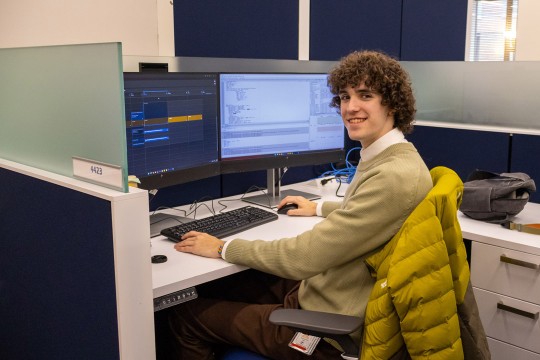RIT's study abroad experiences continue on virtually despite travel restrictions
RIT professor partners with Swedish tour company to provide students virtual travel course
Carla Stebbins partnered with Swedish Health Care Academy to develop a virtual travel course for her class health systems management class.
When Carla Stebbins redesigned the health systems management MS degree, she included a culminating travel course in Sweden for her students to observe a different approach to health care. Stebbins, program director, built the online hybrid program to educate health care leaders to navigate a quickly changing field and widen their perspective. Even though COVID-19 canceled the trip, Stebbins found a solution and “made lemonade out of lemons.”
Health systems management teaches problem solving, and Stebbins negotiated with the study aboard company Swedish Health Care Academy to develop a virtual travel course for her class. The vendor agreed and they created a six-week Zoom class as a pilot. The health systems management program and RIT Global shared the cost of the online travel course since travel plans were abruptly changed and the students were unable to make the trip.
The class of nine students listened to lectures and had conversations with a variety of health care professionals. Concurrently, the students working in small groups applied what they discovered to improve a service, product, or particular system in healthcare in the United States.
“I think the thing that surprised most of us, the students and myself, was early in the lectures, a number of people repeated how much the Swedish people trust their government and how they trust their healthcare system,” Stebbins said. “In this country, we’re so focused on outcome, cost, and access, I don’t know that I’ve heard anyone talk about trust.”
The class discussed how a health system could improve trust with communities, populations, and employees, and whether that would be possible in the United States due to geographic differences and diverse population.
“All of Sweden is 10 million people, and New York City is 10 million, so we’re dealing with a much larger population in the U.S.,” Stebbins said.
Stebbins selected the Swedish health care system to study due to its performance. Their system, designed and maintained by the Swedish government, is ranked much higher than the U.S. overall and on several key outcome measures, Stebbins noted. “Despite their achievement, they, like most of the world, still have room for improvement. They experience health disparity by ZIP code and average life expectancy varies based on where you live in the country, but their costs are dramatically different.”
The class is one example of several virtual intercultural experiences that have allowed students to enrich their cultural knowledge and develop global leadership skills while travel restrictions due to the coronavirus prevent more traditional study abroad opportunities. Professor Laura Shackelford from RIT’s Department of English offered a Transnational Workshop on Digital Creation course that allowed RIT students to team with graduate students at the University of Paris-8 to develop a digital installation project.
Next spring, Professor Jessica Bayliss from the School of Interactive Games and Media will offer an International Game Prototyping course that gives students an international perspective on the importance of business viability in game prototyping with particular attention spent on exploring Japan’s gaming industry. Virtual connections with guest lecturers from Japanese gaming and anime industries and possible virtual site visits to Japanese gaming companies will enhance students’ coursework and give them valuable insight into Japan’s robust gaming culture and business. RIT students will also collaborate with Japanese students on a Game Jam and learn about Japanese culture through online activities to further develop cultural competency skills.
“While nothing can replace the experience of actually traveling abroad, virtual intercultural experiences are proving that we can facilitate fruitful cross-cultural collaborations and students can develop important cultural competencies through the use of technology,” said Jenny Sullivan, director of education abroad and international fellowships.
For more information about RIT’s virtual intercultural experiences, visit the RIT Global website.
Read More
Virtual intercultural experiences bring students from RIT’s campuses across the globe together. And faculty from four RIT campuses collaborate to teach global business class.












